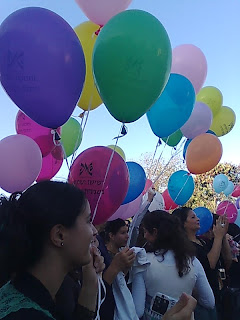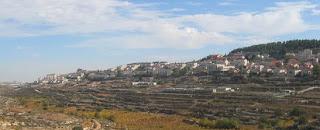 Several years ago, a number of international organizations and companies spearheaded an initiative to raise awareness of breast cancer and generate donations, by selling pink products. One of those companies was KitchenAid. They introduced a line of pink products including a food processor, giving a portion of sales of each item to the Susan G. Komen for the Cure Foundation.
Several years ago, a number of international organizations and companies spearheaded an initiative to raise awareness of breast cancer and generate donations, by selling pink products. One of those companies was KitchenAid. They introduced a line of pink products including a food processor, giving a portion of sales of each item to the Susan G. Komen for the Cure Foundation.Sadly, my mother's family has been repeatedly afflicted by breast cancer. I've lost two beloved aunts, Sybil and Thelma, and other women in the family have undergone treatment. Alissa's family has also experienced breast cancer firsthand.
It seemed perfectly appropriate then to support this initiative, and so we bought the pink KitchenAid. This began an initiative of our own that we call Pink for Pareve. Having a kosher kitchen meant we already had separate dishes and utensils for meat and dairy, but we didn't have any dedicated pareve (neutral) dishes or appliances. Thus, the KitchenAid became the first of our pink pareve items. Since then we've added a pink frypan, a pink pot, pink plastic bowls, pink cutting boards and even pink towels. It's an easy way to remember which items are pareve; more importantly, they are daily reminders of the scourge of breast cancer and its affect on our family.
October is Breast Cancer Awareness month. As part of an effort of Estee Lauder Cosmetics, buildings around the world will be lit up in pink light beginning Wednesday at 8:00pm, including Tel Aviv's Sderot Rothschild, and others. Other international buildings to be coloured include the Japan's Tokyo Tower, New Zealand's Sky Tower, the Millennium Memorial in China, the municipality building in Paris and the LA International Airport.
The Israel Cancer Association (ICA), which is organizing the campaign in Israel, reminds all women aged 50 to 70 that they should get a mammogram every two years; high-risk women should begin undergoing screenings earlier. A number of recent genetic studies have found that Ashkenazi Jewish women have a much higher than average probability of carrying a breast cancer-causing genetic defect.
While all women should be aware of the facts of breast cancer, there are several organizations that address the specific needs of Jewish women.
In Israel, for more information, call 1-800-599-995 or see the ICA Web site at www.cancer.org.il.
Jewish women in the United States should contact Sharsheret for information and support.
Canadian Jewish women should contact the L’Chaim Cancer Support Group for Jewish Women in Canada. They have a DVD entitled, “What Every Jewish Woman Should Know About Cancer.” Topics include breast cancer genetics, finding support from Jewish sources, and helping a friend undergoing cancer treatment. For information about L’Chaim or to order the DVD, please call (416) 630-0203.













